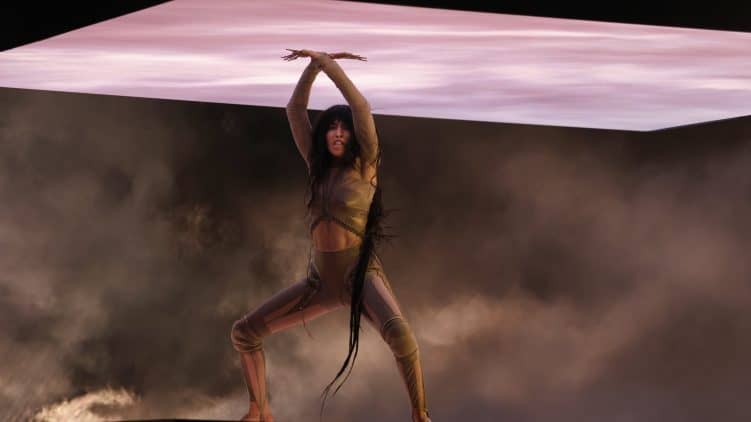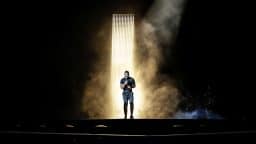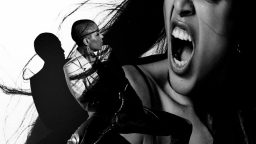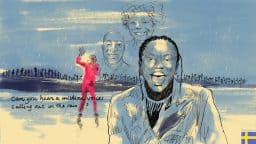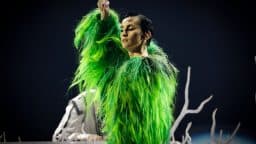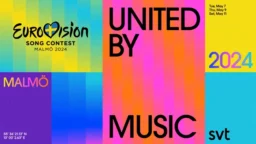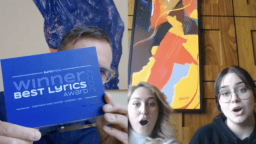If Eurovision were a country, Sweden would be the occupying force. The festival’s Big Boss is from Sweden and there are a great many Swedes involved in the yearly production. Swedish song writers dominate the playing field – or rather ‘singing field’ – (they’ve been involved in four songs this year, four in 2022, eight in 2021, another eight in 2020 and in 2019 in a total of nine songs) and Sweden (with six victories) is very close on the heels of all-time ‘big winner’ Ireland (seven victories) with their Loreen very possibly becoming the new Johnny Logan.
Wait – let’s clearify this. And let’s delve deeper into Tattoo, the song with which Loreen has every chance of winning this year…
Loreen – Logan
Loreen (Lorine Zineb Noka Talhaoui, 39 years old) is going to win. That is the general prediction for this year’s Eurovision. And things would need to take a really surprising turn to prove that prediction wrong, as Tattoo has been in the European charts for several weeks now, and Loreen is travelling to Liverpool with a crown already on her head; her previous Eurovision entry, Euphoria in 2012, turned into one of the most spectacular festival triumphs, with mega streaming volumes and mega success.
That last part, though, is often more of a downside than an advantage when you look at the results of returning winners. In all of Eurovision history, there was only one artist who managed to win the Festival twice: Johnny Logan from Ireland obtained victory with What’s another year (1980) and years later with Hold me now (1987).
The expectations for Loreen to become the next Logan are pretty high, though.
Why?
Here’s why:
Lyrics
Okay, maybe this isn’t the ‘why’ yet – because the lyrics for Tattoo are not exactly award-winning. The best line is the main one from the chorus: you’re stuck on me like a tattoo. We can imagine that the songwriters found that specific phrase first and then started brainstorming around it. Because the rest of the lyrics contain catchphrases that we’ve heard before, in millions of other love songs:
I don’t wanna go, but baby, we both know
this is not our time…
and:
All I want is to be loved and all I care about is you…
This predictability does not hurt the song at all, though, since Tattoo doesn’t rely on its spoken message. The intended message, the feeling that is evoked, is strong enough.
A crush
What is this message that we’re supposed to feel more than hear? We’ll take a better look at how Loreen works with a new song:
It starts with an e-mail. In this case, the e-mail was sent by composer Thomas G:son. Loreen read his message at ten o’clock at night, Eurovision wasn’t even on the table yet, and the only question was: ‘What do you think of this one?’
Loreen could immediately sense something ‘brewing’. Something she describes as ‘a crush’. Not until several weeks later, after she’d already put in some of the ‘hard work’ in the studio (in other words: she’d rearranged the composition in such a way that it now bore her signature) the question came: Would you perhaps be interested in participating in Melodifestivalen, the Swedish selection show for the Song Contest?
Loreen’s immediate reaction was: ‘NO!’
But after a lengthy series of ‘no’s’ in her head, that made people around her conclude: ‘We get it, Loreen, you can’t do it, we’ll tell the organisation that it’s a definite no’ – she suddenly had a change of heart and her whole body told her that, in fact, it ought to be a yes instead. ‘It was like a physical reaction. I’m a bit slow, you know.’
Resurrection
It was that physical, deep-inside feeling stemmed from what her imagination created when she listened to the song. ‘I could see the stage, the decor, the vibe, the colors, the narration of the story… and that’s where I started to build. The visual aspect is the most important one for me.’
This resulted in an exciting, mysterious act. Loreen begins her performance between two horizontal layers that seem to be almost crushing her. She sings, lying down, about how she and her lover need to leave one another. But: the layers on top and underneath her are in fact four-by-four-metre LED screens that can be used for all sorts of projections: earthy colors, natural movements that have a desert-like appearance, with sand dances and dust storms. Gradually the top layer, the ‘ceiling’ is lifted, allowing Loreen to get up. This infuses the entire song with the feeling of a resurrection – a healing, the ability of getting back on her feet.
Hope – strength – nature
This feeling fits the three central words that Loreen uses to describe her performance. ‘The song is a reflection of what I feel within me, and what I think is true for all of us, together. There are some insane things going on in the world right now, like COVID and polarization and the climate crisis. The first thing I want people to feel when hearing Tattoo is hope. Hope is so very important. I’m aware of how lame this may sound, but we have to keep realizing that next to all the negativity in the world there is a lot of beauty.
The second thing I would like people to feel is their own strength.
And the third may sound equally lame, but it’s nature. Because that is where we get our energy from. We walk around in our cities like little batteries, but we need to understand that we can only recharge thanks to nature. Yes, you can also visit a therapist – I’m all for therapy and boy, do I like to talk about myself, haha – but if you combine it with being in the wildness of nature (and I don’t mean a small city park), I’d like to say: call me when you get back and tell me how you feel.’
Intuition
All of this may sound rather spiritual, and that’s correct. Loreen isn’t someone who reasons her way through life; she values the senses, the fingerspitzengefühl, that feeling in your gut. Which is understandable, considering how intuition brought her the Euphoria victory, back in 2012: ‘In the beginning no one believed in the act that I proposed: the intimate stage, my inward dancing moves, me barely looking into the camera. I was terribly afraid of what would happen, but intuitively I knew that that was how it had to be done. So after winning, it was almost as if the universe had spoken to me and said: “See? Intuition is what it’s all about.”‘
Nomadic
There are also some more concrete influences: the sand and earth tones from the Tattoo performance, for instance, are directly related to Loreens ‘nomadic’ nature, as she calls it. Loreen grew up in Sweden, with a Moroccan mother who had descended from a longer line of women who all had to forge their own paths:
Loreen’s grandmother lost her husband to World War II. Her family quite quickly selected a new husband for her, but Loreen’s grandmother preferred making her own decisions. And so she decided to take her two small children along to a small Berber village, to live there in anonymity… dressed as a man. She opened up her own shop and everything.
Loreen’s mother also decided to escape the pressure of family expectations by moving to a strange country, Sweden, when she was fourteen and had no formal education. At sixteen she fell pregnant with her first child and she lost her husband when she was twenty-nine. With the help of that oldest daughter – Loreen – she managed to raise six children by herself.
Statements
Strong women – hence strenght.
Earth tones and the hashtag ⵣ (the Berber symbool) that Loreen often uses in her social media posts – hence nature.
So now all we have to do is find out what has inspired the third central theme, hope.
Let’s go back to Loreen’s previous Eurovision participation for Sweden. Yes, she has tried to make a comeback before. In 2017 she sang a song called Statements, a powerful, angry song that the viewers did not award with enough points, which meant that Loreen didn’t make it past the Swedish semifinals. The song had many political undertones, or, as Loreen herself now says: ‘Statements was a Che Guevara-song. I was motherf*king angry because of the motherf*king times!‘
Constructive
Instead of anger, for Tattoo she now chooses pop (halfway through we reach 150 beats per minute) and encouragement and light. What has changed?
Loreen is a musical activist. When she was in Azerbaijan for Euphoria, she met human rights warriors, she visited dissidents in Belarus, and she fights for global education for children and often voices her opinions on racism and discrimination. The frustration about everything that’s going on in the world hasn’t changed. But, as she says: ‘Let’s be constructive about things, because there are so many things To. Be. Happy. About.’
In other words: there is hope.
The cannon
An underlying basis is fun, but without a good song, such a foundation would be useless. That’s why this time around, nothing’s left to chance. Six names signed up for the music and lyrics of Tattoo. Two women: Loreen, of course, and Moa Carlebecker (who, as a singer, came ninth in the Swedish finals last year and who also wrote the winning song for the American Song Contest). And four men with, let’s put it mildly, ‘ample experience’.
Here’s a list:
Jimmy ‘Joker’ Thörnfeldt has so far written 18 Melodifestivalen songs,
Peter Boström wrote 25,
Jimmy Jansson 31,
and champion Thomas G:son wrote 69 – plus another 35 songs for the qualifying rounds for other countries.
Boström and G:son were also the men behind Euphoria, but for Tattoo they’ve rolled the biggest cannon out of the hangars: a collaboration with their greatest competitors.
Popular
Quite the commercial machinery, you might say. Does that even suit the headstrong Loreen Talhaoui?
Apparently it does. Loreen: ‘It all begins with me. I want to get to know myself and develop myself. Always with the goal of projecting that growth outward. To help others from the basis of my personal experiences, to sympathize with them and to change the community.’
Plus: ‘I like the word popular. It sounds as if you do it for the people. I don’t want to be part of a fun little clique that’s in it for the “art”.’
And: ‘I want to speak to a large group of people, but also maintain my integrity and vision.’
Balance
With Euphoria she has proven very capable of uniting both seemingly opposite sides (the masses and her personal vision) within Eurovision, which she calls ‘an important platform that creates joy, happiness and a sense of community.’
With Tattoo she repeats that unification. When Loreen stands there with her arms wide open, we see on both sides – left and right – the contrasts lying at her palms:
Stockholm on one side – the Rif Mountains on the other
girl on one side – diva on the other
electronic dance music on one side – Arabic orchestration on the other
crusader on one side – unifier on the other sight
art on one side – pop on the other.
And in the best moments – and Tattoo is definitely one of those best moments – everything is neatly kept in balance by what finds itself right between her arms and palms, right in the center:
Loreen’s history, Loreen’s experiences, Loreen’s intuition, Loreen’s voice, Loreen’s eyes, Loreen’s heart.
Sources: here, here, and here.
Photo: Alma Bengtsson/SVT
